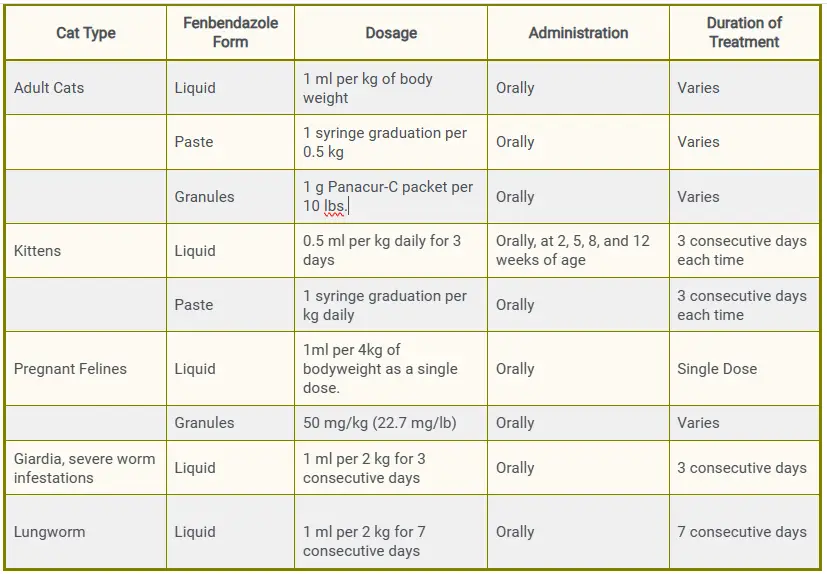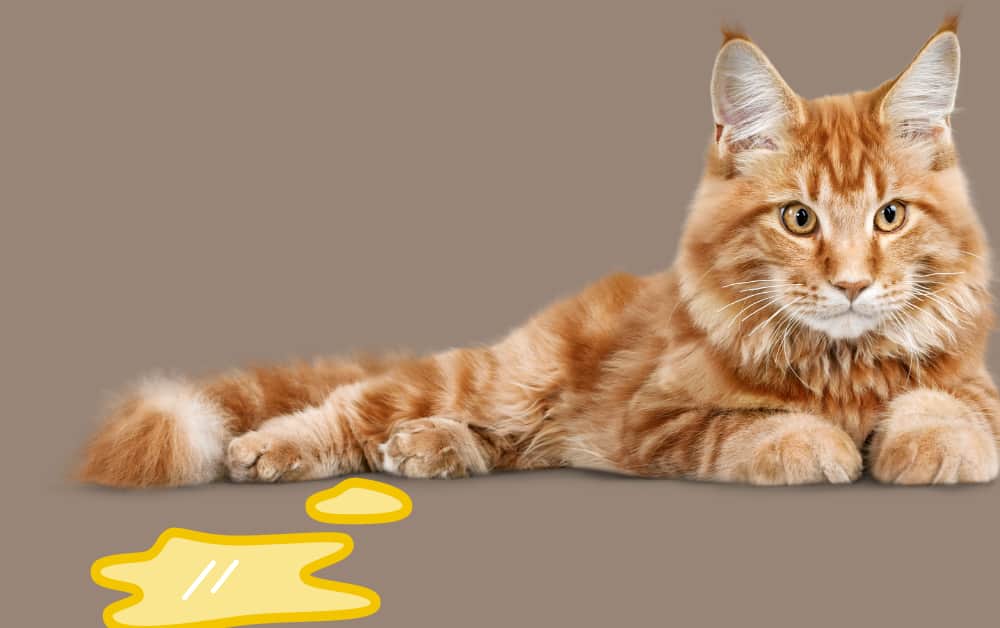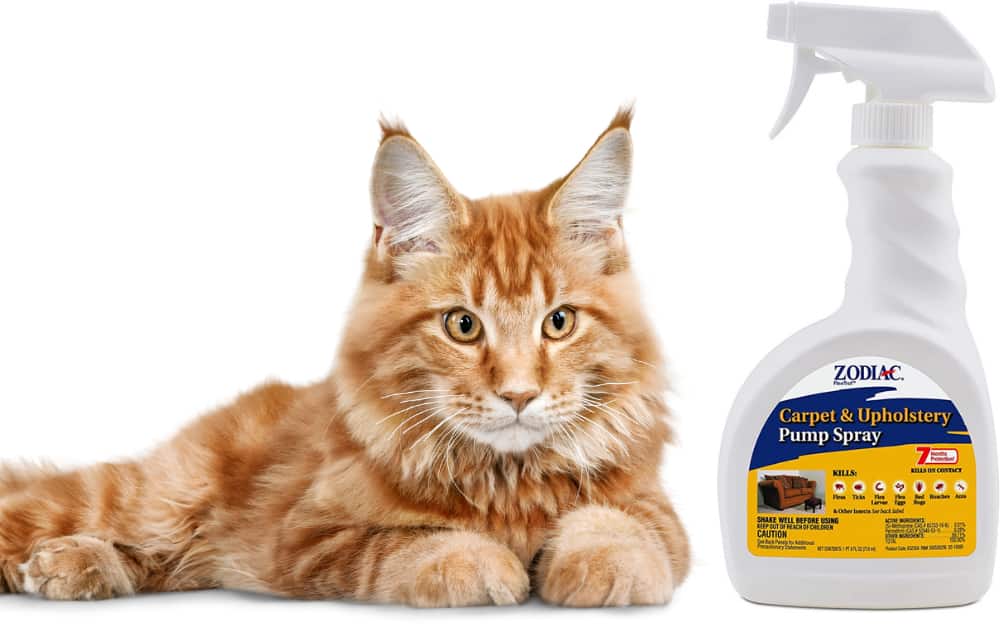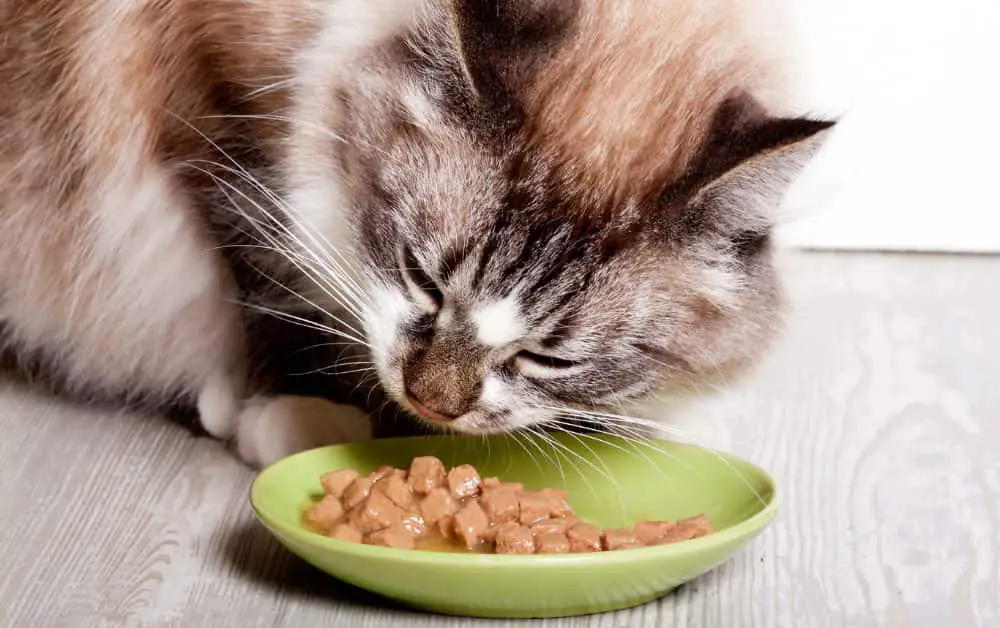For the prevention and treatment of lungworms, giardia, roundworms, and certain species of tapeworms in cats, the recommended dosage of Fenbendazole is 50 mg/kg (22.7 mg/lb). While fenbendazole is FDA-approved for use in dogs, it is not labeled for use in cats. Any dosage prescribed for felines is considered off-label and should be administered with caution.
Fenbendazole Dosage For Cats
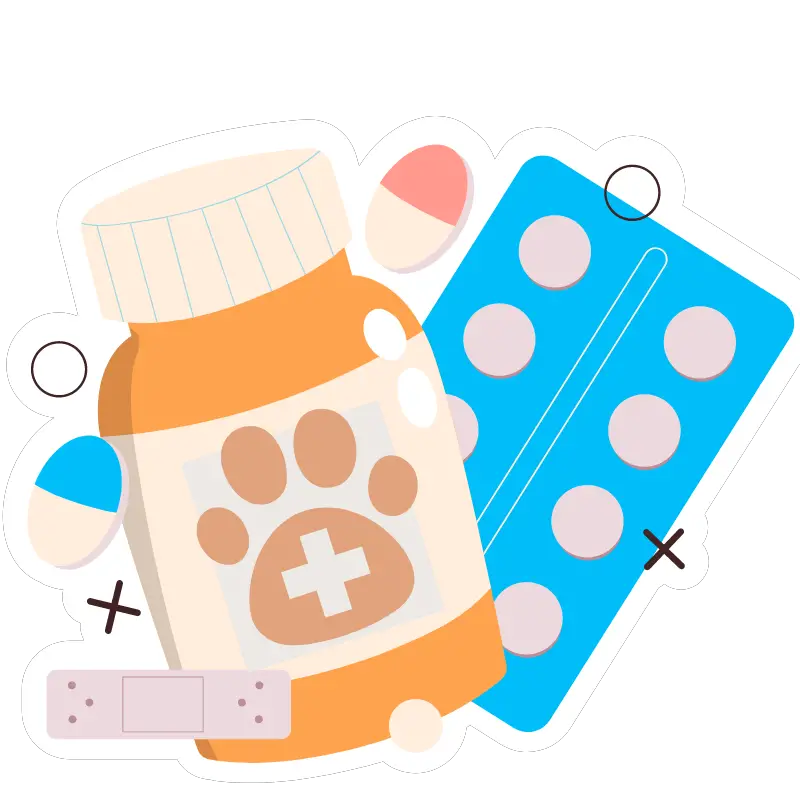
- Ideal Dose: 50 mg/kg (22.7 mg/lb)
- Uses: Lungworms, Giardia, Roundworms, tapeworms.
- FDA Approved: No.
- Variants: Tablets, Liquid, Granules, Oral Paste.
- Popular Brands: Panacur®, Safe-Guard®.
- Storage & Handling: 30°C (86°F).
- Administration: Once Daily.
Disclaimer: Self-medication can be hazardous. Please consult your veterinarian for personalized guidance on the appropriate dosage for your feline friend specific condition.
Caring for our feline companions involves much more than just cuddles and treats; it also entails safeguarding their health against internal parasites. In the realm of deworming medications, fenbendazole emerges as a trusted ally for combating various intestinal parasites in cats.
However, determining the correct fenbendazole dosage for cats requires careful consideration of factors such as weight, age, and the specific type of parasite being targeted.
In this guide, we’ll delve into the intricacies of fenbendazole dosage for cats, ensuring your beloved pet receives the precise treatment they need to thrive.
What is Fenbendazole for Cats?
Fenbendazole for cats is a medication commonly used to treat parasitic infections in cats. It belongs to a class of drugs known as benzimidazoles, which work by disrupting the metabolism of parasites, ultimately leading to their death.
Fenbendazole is effective against various internal parasites in cats, including roundworms, hookworms, whipworms, and certain types of tapeworms.
It’s typically administered orally and is available in multiple forms, such as tablets, granules, or suspensions.
Fenbendazole Dosage For Cats
For Adult Cats:
- Fenbendazole Liquid: 1ml/kg of bodyweight for routine intestinal parasite treatment.
- Fenbendazole Paste: 1 syringe graduation per 0.5kg of bodyweight.
- Fenbendazole Granules: 1g Panacur-C packet per 10 lbs (4kg) of bodyweight.
For Kittens:
- Fenbendazole Liquid: 0.5 ml/kg each day for 3 consecutive days at 2, 5, 8, and 12 weeks of age.
- Fenbendazole Paste: 1 syringe graduation/kg of bodyweight each day for 3 consecutive days.
Pregnant Cats:
- Fenbendazole Liquid: 1ml per 4kg of bodyweight as a single dose.
- Fenbendazole Paste: Not recommended.
- Fenbendazole Granules: 50 mg/kg (22.7 mg/lb).
For Giardia and severe clinical worm infestations in cats:
- 1ml per 2kg of bodyweight for 3 consecutive days.
For Lungworm in Felines:
- 1ml per 2kg of bodyweight for 7 consecutive days.
Fenbendazole Dosage Chart for Cats
| Cat Type | Fenbendazole Form | Dosage | Administration | Duration of Treatment |
|---|---|---|---|---|
| Adult Cats | Liquid | 1 ml per kg of body weight | Orally | Varies |
| Paste | 1 syringe graduation per 0.5 kg | Orally | Varies | |
| Granules | 1 g Panacur-C packet per 10 lbs. | Orally | Varies | |
| Kittens | Liquid | 0.5 ml per kg daily for 3 days | Orally, at 2, 5, 8, and 12 weeks of age | 3 consecutive days each time |
| Paste | 1 syringe graduation per kg daily | Orally | 3 consecutive days each time | |
| Pregnant Felines | Liquid | 1ml per 4kg of bodyweight as a single dose. | Orally | Single Dose |
| Granules | 50 mg/kg (22.7 mg/lb) | Orally | Varies | |
| Giardia, severe worm infestations | Liquid | 1 ml per 2 kg for 3 consecutive days | Orally | 3 consecutive days |
| Lungworm | Liquid | 1 ml per 2 kg for 7 consecutive days | Orally | 7 consecutive days |
The above fenbendazole dosage chart for felines by weight is provided for educational purposes only and should not substitute for veterinary advice. Always start with the minimum dose for your feline until your vet prescribes an increase in dosage.
Related Post: Panacur Dosage For Cats
Fenbendazole Uses in Cats
- Roundworm treatment
- Hookworm treatment
- Whipworm treatment
- Giardia treatment (off-label)
- Lungworm treatment (less common)
Related Post: Phenylpropanolamine Dosage For Cats
Side Effects in Cats
- Gastrointestinal upset (vomiting, diarrhea, decreased appetite)
- Lethargy
- Allergic reactions (itching, hives, facial swelling)
- Neurological symptoms (tremors, seizures)
- Liver toxicity (rare)
- Bone marrow suppression (rare)
Which Cats Should Not Take Fenbendazole.
Felines with the following health issues should not take Fenbendazole without veterinary recommendations.
- Pregnant or nursing cats
- Cats with known allergies to fenbendazole
- Cats with liver disease
- Cats with severe gastrointestinal issues
- Cats with neurological disorders
FAQs
Can Fenbendazole Be Used for Preventive Measures?
Yes, Fenbendazole can be used for preventive measures in cats. It is commonly used to prevent and treat various parasitic infections in cats, including roundworms, hookworms, whipworms, and certain types of tapeworms.
Are There Any Drug Interactions to Consider?
There are generally no significant drug interactions reported with Fenbendazole when used in cats. However, it’s always a good idea to consult with a veterinarian, especially if your cat is taking other medications, to ensure there are no potential interactions.
How Long Does It Take for Fenbendazole to Work in Cats?
The onset of action of Fenbendazole in felines can vary depending on the type and severity of the parasitic infection being treated. In general, it may take a few days to start seeing noticeable effects, but it’s essential to complete the full course of treatment as prescribed by your veterinarian.
Can Fenbendazole Cause Adverse Reactions in Cats?
While Fenbendazole is generally considered safe for use in cats, there is a potential for adverse reactions, although they are rare. Some felines may experience mild gastrointestinal upset, such as vomiting or diarrhea, during or after treatment.
Is Fenbendazole Safe for Long-Term Use in Cats?
Fenbendazole is considered safe for short-term and long-term use in cats when used as directed by a veterinarian. However, prolonged or frequent use may increase the risk of developing resistance in parasites. Therefore, it’s essential to follow your veterinarian’s recommendations regarding the frequency and duration of treatment to minimize this risk and ensure the continued effectiveness of the medication.
